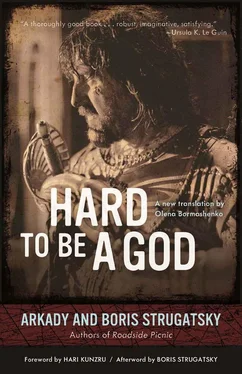“Be good to take a swim,” said Pashka, plunging his arm into the water up to his elbow. “It’s cold,” he reported.
Anton clambered to the front and jumped onto the shore. The boat swayed. Anton grabbed its side and looked expectantly at Pashka. Then Pashka stood up, put the oar behind his neck like a yoke, and wriggling his lower body, sang:
Grizzled seadog Tarkypark!
Pal, you’d better stay awake.
Careful, schools of deep-fried sharks
Rush toward you through the lake.
Anton silently jerked the boat.
“Hey, hey!” Pashka shouted, grabbing at the sides.
“Why deep-fried?” Anka asked.
“Dunno,” answered Pashka. They climbed out of the boat. “Sounds good, huh? Schools of deep-fried sharks!”
They hauled the boat onto the shore. Their feet sank into the damp sand, full of dried needles and pinecones. The boat was heavy and slippery, but they managed to drag it out all the way to the stern, then stopped, breathing hard.
“I crushed my foot,” said Pashka, fixing his red bandanna. He always made sure that his bandanna was tied precisely over his right ear, in the fashion of the hook-nosed Irukanian pirates. “Life ain’t worth a dime,” he declared.
Anka was intently sucking on her finger.
“A splinter?” Anton asked.
“No. A scratch. One of you two has real claws…”
“Let me have a look.”
She showed him.
“Yes,” said Anton. “A wound. Well, what should we do?”
“Hoist the boat onto our shoulders and walk along the shore,” Pashka suggested.
“So why did we get out?” Anton asked.
“Any idiot could manage in the boat,” Pashka explained. “But on the shore, there are reeds—that’s one. Cliffs—that’s two. And ponds—that’s three. And the ponds are full of carp, and catfish.”
“Schools of deep-fried catfish,” said Anton.
“You ever dive into a pond?”
“Sure”.
“Never seen you do it. Must have missed it somehow.”
“Lots of things you haven’t seen.”
Anka turned her back to them, raised her crossbow, and shot at a pine tree about twenty paces away. Bits of tree bark rained down.
“Nice,” said Pashka, and immediately fired his rifle. He had aimed at Anka’s bolt, but he missed. “Didn’t hold my breath,” he explained.
“And if you had?” asked Anton. He was looking at Anka.
Anka pulled the bowstring lever. She had excellent muscles—Anton enjoyed watching the little hard ball of her biceps roll under her tanned skin. She took very careful aim and fired another bolt. It pierced the tree trunk right below the first with a crack. “We shouldn’t be doing that,” she said, lowering her crossbow.
“Doing what?” Anton asked.
“Hurting the tree, that’s what. Some kid was shooting at a tree with a bow yesterday, so I made him pull the arrows out with his teeth.”
“Pashka,” said Anton. “Go on, you have good teeth.”
“One of my teeth makes me whistle,” he retorted.
“Forget it,” said Anka. “Let’s do something.”
“I don’t feel like climbing cliffs,” Anton said.
“Me neither. Let’s go straight.”
“Go where?” Pashka asked.
“Wherever.”
“Well?” said Anton.
“That means the saiva,” Pashka said. “Let’s go to the Forgotten Highway. Remember, Toshka?”
“Of course!” Anton replied.
“You see, Anechka—” Pashka began.
“Don’t you call me Anechka,” Anka said sharply. She couldn’t stand it when people called her anything other than Anka.
Anton took careful note of her preference. He quickly said, “The Forgotten Highway. No one drives on it. And it’s not on the map. And we have no idea where it goes.”
“And you’ve been there?”
“Once. But we didn’t have the time to explore.”
“A road from nowhere to nowhither,” declared the recovered Pashka.
“That’s amazing!” Anka said. Her eyes became like black slits. “Let’s go. Will we make it by night?”
“Come on! We’ll make it by noon.”
They climbed up the cliff. When he got to the top, Pashka turned around. He saw the blue lake with the yellowish bald patches of the sandbars, the boat lying on the sand, and large ripples spreading in the calm, oily water by the shore—probably a splash from that same pike. And Pashka was filled with the vague elation he always felt when he and Anton had run away from boarding school and a day of total independence lay ahead—full of undiscovered places, wild strawberries, hot deserted meadows, gray lizards, and ice-cold water from unexpected springs. And as always, he wanted to whoop and leap up high in the air, and he immediately did so, and Anton looked at him, laughing, and Pashka saw that Anton’s eyes expressed complete understanding. And Anka put two fingers in her mouth and gave a wild whistle, and they entered the forest.
It was a forest of sparse pines; their feet kept slipping on the fallen needles. The slanting rays of the sun fell between the straight trunks, and the ground was dappled with golden spots. It smelled of tar, the lake, and wild strawberries; unseen birds screeched somewhere in the sky.
Anka was walking in front, holding the crossbow underneath her arm, occasionally bending down to pick the blood-red wild strawberries, so shiny they looked varnished. Anton followed with the good old-fashioned arbalest of Marshal Totz on his shoulder. The quiver with the good old-fashioned bolts slapped heavily against his behind. He walked and glanced at Anka’s neck—tanned, almost black, with protruding vertebrae. Once in a while he’d look around, searching for Pashka, but Pashka was nowhere to be found—except that from time to time, first to his right, then to his left, a red bandanna would flash in the sun. Anton pictured Pashka silently gliding between the pine trees, his rifle at the ready, his thin, predatory face with the peeling nose stretched out in front of him. Pashka was stealing through the saiva, and the saiva meant business. The saiva will call, my friend—and you have to respond in time, thought Anton. He was about to duck down, but Anka was in front of him and she might turn around. It’d be ridiculous.
Anka turned around and asked, “You left quietly?”
Anton shrugged. “Who leaves loudly?”
“Actually, I might have been noisy,” Anka said anxiously. “I dropped a basin—then, suddenly, there were footsteps in the hall. Must have been old maid Katya—she’s on duty today. I had to jump into the flower bed. What do you think, Toshka, what kind of flowers grow in there?”
Anton furrowed his brow. “Underneath your window? No idea. Why?”
“Very hardy flowers. ‘No wind can bend them, no storm can fell them.’ People have jumped in there for years, but they couldn’t care less.”
“That’s interesting,” Anton said with an air of deep thought. He remembered that underneath his window there was also a flower bed with flowers “no wind can bend, no storm can fell.” But he had never paid any attention.
Anka stopped, waited for him, and offered him a handful of wild strawberries. Anton carefully took three berries. “Have some more,” said Anka.
“Thanks,” said Anton. “I like taking them one by one. Old maid Katya isn’t too bad, right?”
“Depends on your point of view,” said Anka. “When someone tells you every night that your feet are either dirty or dusty…” She stopped talking. It was wonderful walking alone in the forest with her like this, shoulder to shoulder, bare elbows touching, glancing over occasionally to take in how pretty she was, how agile, and how amazingly friendly. How her eyes were big and gray, with black eyelashes.
“Yeah,” said Anton, stretching out his hand to brush aside a cobweb that gleamed in the sun. “I bet her feet are never dusty. If you’re carried over puddles, you sure won’t get covered in dust…”
Читать дальше












